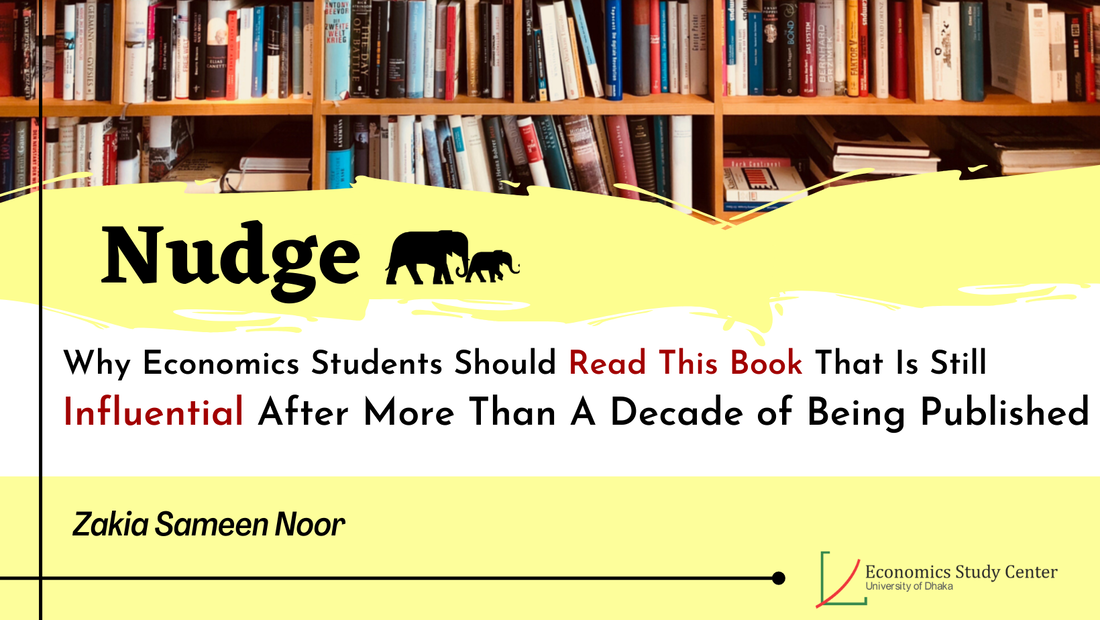ECONOMICS STUDY CENTER, UNIVERSITY OF DHAKA
|
Zakia Sameen Noor Two years ago, for our finance course, we had to do a group presentation on ‘nudge economics’. This was when I first read the book “Nudge: Improving Decisions About Health, Wealth, and Happiness”. I was fascinated by the psychological insights and their real-life economic applications, especially how a nudge could bring positive results with extraordinarily little effort. This led me to explore the systemic flaws in thinking that affect our everyday decision-making, which we are unaware of. That’s unfortunate because becoming aware of our biases can help us make better informed decisions. Thus, reading the book “Nudge” became my gateway to the world of behavioral economics. The pioneers of the ‘nudge’ concept, Richard H. Thaler and Cass Sunstein, are highly esteemed professors of Economics and Law respectively at the University of Chicago (Sunstein is now at Harvard Law School). Their work on ‘nudge’ builds upon the work of Daniel Kahneman and Amos Tversky – two psychologists who pioneered the development of behavioral economics with their research on human biases and heuristics that affect judgment. Their argument is that the conventional economic presumption of human rationality to everyday life is wrong. Plethora of studies prove that we are subject to a lot of systemic biases that affect our thinking and make us act in irrational ways. paradox, planning fallacy, and risk aversion are extremely powerful. They subconsciously affect our actions. Here, a nudge would help us be better off. Its power lies in being an easy intervention that’s cheap to avoid. It’s just a simple push by a choice architect (one who designs the environment where the users would make different choices) to subconsciously move the users to make better choices. It’s a form of ‘libertarian paternalism’, a movement advocated by the authors. Though an oxymoron concept, it’s actually common sense. For example, the health of the schoolkids can be improved by changing the order in which food is displayed like keeping healthier options in front. No need for banning junk food or attempting to incentivize the schoolkids to choose healthier options, which is subject to rebellion or requires heavy effort. These are heavy topics. Yet, the authors do a fantastic job of making these easier to understand. The language is simple, and the explanations are succinct. Despite their academic stature, the authors make themselves appear as regular people like us who too are susceptible to the same biases just like us and Homer Simpson. Indeed, the occasional humorous pop culture references and the humaneness of the authors makes the book an immersive and enjoyable read. For aspiring policymakers, “Nudge” offers great research on the implementation of nudge on public policies, which is what most of the book is about. So many examples! An interesting one is the argument for ‘opt-out’ instead of ‘opt-in’. Take organ donations. Even if people choose to donate their organs after death, most of them wouldn’t follow through because of procrastination. So, if the default option is to make organ donations mandatory while the choice to ‘opt-out’ is optional, a lot of lives would be saved with people still reserving their freedom to choose. This is what happened in Illinois. Another unique nudge policy that showed encouraging results in cities like North Carolina was the ‘dollar a day’ program to prevent teenage pregnancy. The total cost of this program is low whereas for the teenage mothers who get paid one dollar for every day they are not pregnant, the return is high. There are also examples of programs that weren’t nudge efficient and hence, didn’t produce the positive results they could have. An example is President Bush’s ambitious Medicare plan that relied on maximizing healthcare choices without having a default ‘opt-in’ option. Also, there was too many complicated information that impeded decision-making. The power of any book lies in its impact on several people which induces them to think differently and act accordingly. Such is the power of the book “Nudge: Improving Decisions About Health, Wealth, and Happiness” that has influenced famous politicians like David Cameron and Barack Obama, and innovative companies like Uber. Even I was surprised to see myself applying nudges in real life like choosing a smaller plate for food to lose weight. I also marveled at the observation that no choice architecture is neutral. For each of us, our entire environment in which we grew up – familial, social, political – was choice architecture with critical choice architects like parents, teachers, friends, and governments shaping our actions, behavior, and identities. PS: if you’re influenced to read the book after this essay, you too have been nudged. Author
0 Comments
Leave a Reply. |
Send your articles to: |



